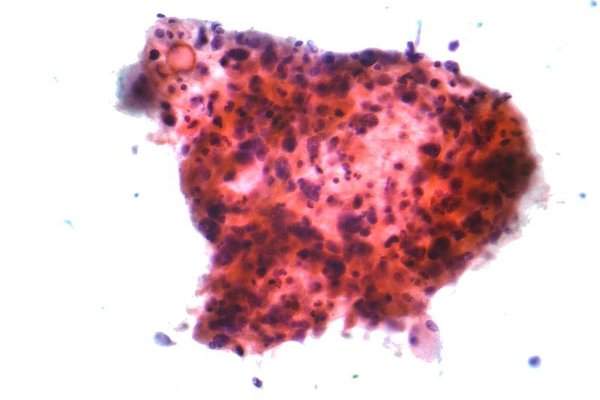

Pfizer and Merck team up on Phase Ib combination trial to treat lung cancer

Pfizer agreed to evaluate the combination of its lung cancer drug crizotinib (Xalkori) with Merck’s investigational anti-PD-1 antibody pembrolizumab, in a Phase Ib clinical trial to treat patients with ALK-positive advanced or metastatic non-small cell lung cancer (NSCLC).

Discover B2B Marketing That Performs
Combine business intelligence and editorial excellence to reach engaged professionals across 36 leading media platforms.
The multi-centre, open-label clinical trial will evaluate the safety and tolerability of the combination therapy, and is scheduled to be initiated in 2015 by Pfizer.
Xalkori is a kinase inhibitor indicated to treat patients with metastatic NSCLC whose tumours are anaplastic lymphoma kinase (ALK)-positive as detected by an FDA-approved test, while pembrolizumab is designed to reactivate anti-tumour immunity.
Amgen’s Phase III ASPIRE trial of myeloma treatment Kyprolis meets primary endpoint

US-based Amgen and its subsidiary, Onyx Pharmaceuticals, reported data from the Phase III ASPIRE trial of carfilzomib, lenalidomide, and dexamethasone versus lenalidomide and dexamethasone to treat patients with relapsed multiple myeloma.
The trial met its primary endpoint of progression-free survival (PFS), and patients treated with Kyprolis (carfilzomib) by injection in combination with Revlimid (lenalidomide) and low-dose dexamethasone (KRd) lived significantly longer without their disease worsening compared with those treated with Revlimid and low-dose dexamethasone (Rd).

US Tariffs are shifting - will you react or anticipate?
Don’t let policy changes catch you off guard. Stay proactive with real-time data and expert analysis.
By GlobalDataThe company said that the data for overall survival, a secondary endpoint, is not yet mature and the analysis showed a trend in favour of KRd that did not reach statistical significance.
Mesoblast and NIH partner on 120-patient trial to treat end-stage heart failure
Australia-based regenerative medicine company Mesoblast has signed an agreement with the US National Institutes of Health’s (NIH) National Heart, Lung and Blood Institute to carry out a clinical trial using the company’s adult stem cell therapy for the treatment of patients with advanced heart failure.
The treatment is indicated for patients who require an implantable left ventricular assist device (LVAD) to maintain circulatory support.
The trial is also supported by the National Institute of Neurological Disorders and Stroke, part of the NIH, and the Canadian Institutes for Health Research.
AstraZeneca reports positive top-line results of CAZ-AVI phase three studies
AstraZeneca reported positive top-line results from the phase three studies deployed to investigate the potential of the antibiotic ceftazidime-avibactam (CAZ-AVI) to treat hospitalised adult patients with complicated intra-abdominal infections (cIAI).
CAZ-AVI is composed of cephalosporin (ceftazidime), an established treatment for serious bacterial infections and a next-generation non-beta lactam beta-lactamase inhibitor (avibactam).
The RECLAIM-1 and RECLAIM-2 phase three studies have evaluated the safety and efficacy of CAZ-AVI, which is under development with AstraZeneca to treat wide range of gram-negative bacterial infections that are becoming resistant to antibiotics.
Janssen Biotech to start second Phase III myeloma trial of daratumumab in H1 2015
Danish biotechnology firm Genmab’s collaboration partner Janssen Biotech announced plans to initiate a second Phase III trial (MMY3008) of daratumumab for the treatment of patients with multiple myeloma.
Scheduled to start in the first half of 2015, the trial is designed to compare daratumumab in combination with lenalidomide and dexamethasone to lenalidomide and dexamethasone alone for patients who are not considered candidates for stem cell transplantation (SCT).
Daratumumab, a human CD38 monoclonal antibody with broad-spectrum killing activity, targets the CD38 molecule, which is highly expressed on the surface of multiple myeloma cells.
Isis begins Phase III ENDEAR trial for spinal muscular atrophy treatment in infants

US-based Isis Pharmaceuticals started a pivotal Phase III trial called Endear, evaluating ISIS-SMN in infants with spinal muscular atrophy (SMA), the most common genetic cause of infant mortality.
The dosing of the first infant in this trial will be carried out within the next few weeks. At that time the company will earn an $18m milestone payment from its development partner, Biogen Idec.
Endear is the first of several planned trials in a broad and comprehensive late-stage clinical development programme for ISIS-SMN.
The company is also planning to begin a second pivotal trial in children with SMA later in 2014.
Baxter reports top-line results from BAX 855 Phase III clinical trial

Baxter International reported top-line results from its BAX 855 Phase III clinical trial, which is an investigational and extended half-life recombinant factor VIII (rFVIII) treatment for haemophilia A based on ADVATE [Antihemophilic Factor (Recombinant)].
The study has met its primary end-point in reducing annualised bleed rates (ABR) in the prophylaxis arm compared to the on-demand arm, according to the company.
The study revealed that BAX 855 has controlled and prevented bleeding, routine prophylaxis, as well as managed perioperative in patients who were 12 years or older.
Avanir starts AVP-786 Phase II trial to treat major depressive disorder
US-based Avanir Pharmaceuticals enrolled the first patient in its Phase II trial of its new investigational drug, AVP-786, for the adjunctive treatment of major depressive disorder (MDD).
AVP-786 is a combination of deuterium modified dextromethorphan and ultra-low dose quinidine.
The ten-week, multicentre, Phase II trial is designed to assess the efficacy and safety of AVP-786 in patients who have had an inadequate response to commonly prescribed antidepressants, such as selective serotonin reuptake inhibitors (SSRIs) and serotonin-norepinephrine reuptake inhibitors (SNRIs).
The randomised, double-blind, placebo-controlled proof-of-concept trial is intended to reduce placebo response rates, a phenomenon commonly observed in depression trials.





